
LIBRI DI ALBERTO QUAGLI
La ricerca ha estratto dal catalogo 41 titoli


The main objective of this paper is to deal with the relationship between financial and management accounting concerning goodwill accounting. In this research I referred to the existing literature on goodwill accounting, impairment losses, and impairment testing, considering both the amortization and the impairment era in order to understand how interrelationships between financial and management accounting based on goodwill accounting were investigated theoretically. The results of the review still show a lack of dialogue in the accounting research. Even though the scant empirical evidence of operating practice within the companies demonstrate a natural linkage during the impairment era, internal and external reporting are still considered as two separate domains. This result, more logical in the amortization era, denotes by now a relevant gap in accounting research and it is time to pose some relevant research questions to open up an interdisciplinary (internal and external reporting) view. It is possible that the development of this new strand of research helps to advance our knowledge of business on many fronts. I refer to the advancement necessary to explain the mixed results of financial accounting studies such as the controversial value relevance of write-offs or the reason for opportunistic behavior in goodwill accounting, to interpret how financial accounting rules influence management accounting and, in the opposite sense, how management accounting represents a relevant factor in determining the financial reporting environment. A less myopic view, more open to a comparison between management and financial accounting, will also help standard setters , to understand if their rules require the disclosure of already adopted internal practices, if they favor company managerial growth, or if they add new and too sophisticated administrative tasks, too far from the current state of managerial thinking.



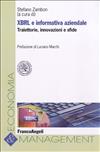
Traiettorie, innovazioni e sfide
L’XBRL (linguaggio utilizzato per lo scambio elettronico di informazioni contabili e finanziarie) è divenuto standard obbligatorio per il deposito dei bilanci societari. Il volume fa il punto della situazione sul suo utilizzo a livello nazionale e internazionale, sulle sue potenzialità di impiego, sulle sue caratteristiche ed elementi di forza e debolezza. Un’opera per accademici, manager, consulenti dell’area amministrazione, finanza e controllo, dottori commercialisti, revisori, consulenti del lavoro, IT specialists.
cod. 366.51
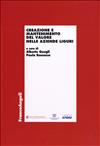
La ricerca delinea un quadro dell’economia ligure e dei suoi andamenti economici settoriali, e analizza la capacità delle imprese di creare e mantenere valore nel corso del tempo. La performance delle aziende liguri è studiata sia con analisi quantitative sia attraverso interviste volte a individuarne i fattori critici di successo e i legami con il territorio.
cod. 365.862
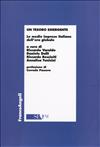
Le medie imprese italiane dell'era globale
Il volume offre una visione organica dei fattori di successo e di sostenibilità della media impresa italiana. Presenta un modello analitico basato su quattro asset (imprenditorialità, competitività, organizzazione e internazionalizzazione) e alcune chiavi di lettura generali, nonché le relative implicazioni per la gestione delle imprese e per le decisioni di policy. Analizza infine trenta casi di studio per sviluppare il modello analitico e le relative implicazioni.
cod. 364.170
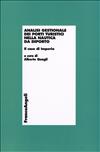
Il caso di Imperia
Il volume, dopo aver inquadrato il complessivo settore della nautica da diporto e della cantieristica, si sofferma sull’analisi strategica dei porti turistici, alla luce delle scelte competitive e dei risultati economici raggiunti. Si analizzano quindi le caratteristiche dei porti dell’Imperiese, studiando l’offerta di servizi portuali, la relativa domanda rivolta dagli utenti e il livello dei risultati economico-finanziari raggiunti, tramite una comparazione con un campione nazionale di porti turistici.
cod. 365.684
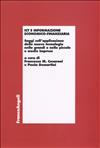
Saggi sull'applicazione delle nuove tecnologie nelle grandi e nelle piccole e medie imprese
Al fine di rendere fecondo il connubio ICT e informazione economico-finanziaria, è necessario partire dall’analisi delle esigenze conoscitive dei destinatari del sistema informativo, siano essi espressione degli organi di governo aziendali o stakeholder esterni. Il volume analizza il contributo dei nuovi sistemi informativi, con particolare riferimento ai seguenti temi: la gestione del sapere e del capitale intellettuale, il controllo di gestione, la comunicazione agli stakeholder e ai mercati finanziari.
cod. 365.627
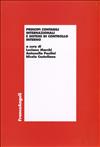
Gli impatti più significativi dell’applicazione dei principi contabili internazionali IAS/IFRS sui sistemi di controllo interno e, in particolare, sui sistemi di: corporate governance e risk management, reporting, costing, budgeting e business planning, sistemi informativi e procedure organizzative. Un contributo interessante per ampliare la comprensione delle novità introdotte dai principi contabili internazionali e delle implicazioni legate all’uso delle informazioni a essi correlate.
cod. 365.575
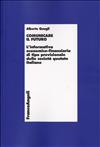
L'informativa economico-finanziaria di tipo previsionale delle società quotate italiane
cod. 365.348
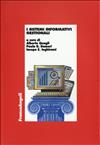
cod. 361.53

cod. 365.399

Gli strumenti e gli intermediari
cod. 365.356

Il comportamento delle società
cod. 365.355

cod. 1820.65

L’articolo descrive le potenzialità ed i rischi della distribuzione da parte delle società di informazioni economico-finanziarie tramite i propri siti web ed i modelli di comunicazione impiegabili sul canale Internet rivolti ai mercati finanziari. È analizzato inoltre il quadro normativo attualmente esistente nel nostro Paese per tale tipo di informativa societaria. La parte finale presenta i risultati di una indagine condotta presso un campione di analisti finanziari in merito all’utilizzo di Internet come canale informativo in merito alle società oggetto della loro attenzione.

cod. 1820.26

Motivare individualizzare valutare orientare negli istituti professionali
cod. 292.22